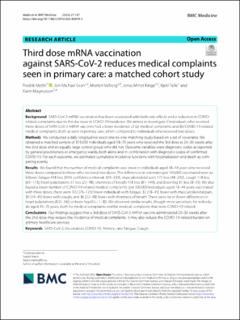| dc.description.abstract | Background SARS-CoV-2 mRNA vaccination has been associated with both side effects and a reduction in COVID-related complaints due to the decrease in COVID-19 incidence. We aimed to investigate if individuals who received three doses of SARS-CoV-2 mRNA vaccines had a lower incidence of (a) medical complaints and (b) COVID-19-related medical complaints, both as seen in primary care, when compared to individuals who received two doses. Methods We conducted a daily longitudinal exact one-to-one matching study based on a set of covariates. We obtained a matched sample of 315,650 individuals aged 18–70 years who received the 3rd dose at 20–30 weeks after the 2nd dose and an equally large control group who did not. Outcome variables were diagnostic codes as reported by general practitioners or emergency wards, both alone and in combination with diagnostic codes of confirmed COVID-19. For each outcome, we estimated cumulative incidence functions with hospitalization and death as competing events. Results We found that the number of medical complaints was lower in individuals aged 18–44 years who received three doses compared to those who received two doses. The differences in estimates per 100,000 vaccinated were as follows: fatigue 458 less (95% confidence interval: 355–539), musculoskeletal pain 171 less (48–292), cough 118 less (65–173), heart palpitations 57 less (22–98), shortness of breath 118 less (81–149), and brain fog 31 less (8–55). We also found a lower number of COVID-19-related medical complaints: per 100,000 individuals aged 18–44 years vaccinated with three doses, there were 102 (76–125) fewer individuals with fatigue, 32 (18–45) fewer with musculoskeletal pain, 30 (14–45) fewer with cough, and 36 (22–48) fewer with shortness of breath. There were no or fewer differences in heart palpitations (8 (1–16)) or brain fog (0 (− 1–8)). We observed similar results, though more uncertain, for individuals aged 45–70 years, both for medical complaints and for medical complaints that were COVID-19 related. Conclusions Our findings suggest that a 3rd dose of SARS-CoV-2 mRNA vaccine administered 20–30 weeks after the 2nd dose may reduce the incidence of medical complaints. It may also reduce the COVID-19-related burden on primary healthcare services. | |
